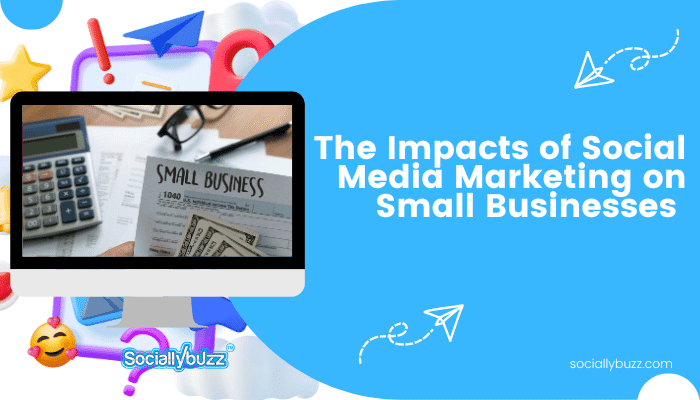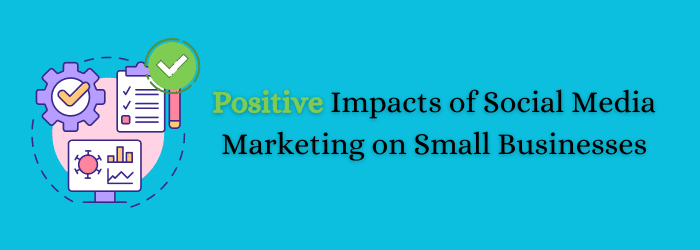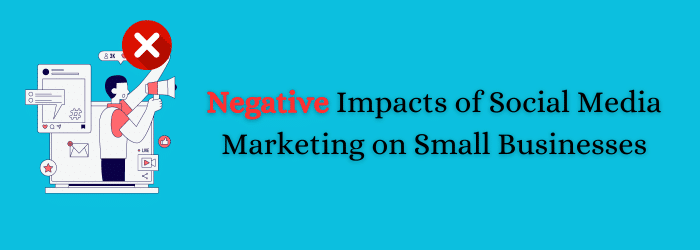
The impact of social media marketing on small businesses is far-reaching and extends beyond social media. It encompasses positive and negative components that affect the overall image of a business.
Social media platforms such as Facebook, X, Instagram, LinkedIn, and others have become indispensable tools in the world of marketing and branding. With more than 4.89 billion users worldwide, small business owners leverage social media to reach and connect with their ideal audience, build brand awareness, generate website traffic and increase sales.
However, when employed wrongly, social media marketing can cause several issues for small business owners, especially if they don’t have an effective social media team.
Issues like negative or misleading feedback, misalignment of content with your audience, and accidental release of confidential information are some negative effects of social media on small businesses. In the article, we discussed some of the positive and negative impacts of social media marketing on small businesses.
Sociallybuzz is a leading social media marketing, management, and digital advertising agency for small and medium-sized businesses. With over 17 years of experience as one of the first social media marketing agencies in the world, we know how to create and execute marketing campaigns that will help you grow your business. Our social media agency has created successful targeted social media campaigns that acquired our customers more leads, sales, and revenue.

Social media marketing allows your business to attract a wider audience. It can raise your brand visibility and recognition beyond your immediate geographic region by connecting you with prospective customers in other locations.
Many social media users use the platform to research products and learn about businesses, which makes it a powerful channel for building brand awareness.
Brand awareness is the first step to acquiring new leads, gaining a competitive advantage, and increasing sales. Effective social media marketing has the power to go viral online, reaching millions of people and catapulting a business into unprecedented levels of popularity. Crafting relatable, shareable, and, most importantly, emotionally compelling content is one of the best practices for building brand awareness.
Social media allows you to engage with your customers actively. Effective customer engagement makes your customers feel heard and their opinions valued. About 41% of marketers concur that businesses increase their relevance on social media when they actively interact with and respond to their audience.
Consistently engaging with customers through posts, comments, and conversations develops trust, loyalty, and a deep emotional bond between your brand and its audience. This increases customer satisfaction and motivates consumers to become brand ambassadors who create favorable word-of-mouth and attract new customers.
By actively engaging your audience, you can build a community of loyal customers who have an emotional connection to your brand. Social media brand communities are particularly effective business tools because they let businesses interact in real-time with their audience. You can quickly test new product mockups, get feature requests, publish content, and gather feedback from members of your community that will help you improve every part of your business.
Learn How to Build a Social Media Policy for Your Business
Social media marketing is usually not a process of advertising to the general public. It is a streamlined effort geared toward a specific audience. Marketing without an adequate knowledge of your target audience leads to a marketing failure.
Targeted advertising allows you to channel your marketing campaigns to your ideal customer’s specific traits, interests, and preferences.
Social media platforms offer advanced targeting features that enable businesses to create ads relevant to particular interest groups and demographics. This way, your marketing efforts reach the appropriate demographic due to accurate targeting.
For example, Facebook provides biographical details of users on their profiles. Business owners can utilize this information to tailor their promotional content towards users of interest.
Social media marketing is cost-effective and profitable when done properly. Social media marketing is less expensive than traditional forms of promotion. You can reach a huge audience for a minimal financial investment.
Social media marketing utilizes the principles of targeted advertising and marketing. Hence, it maximizes brand recognition within the target demographic while minimizing expenses. Additionally, it lowers operating costs and raises the company’s profit margin.
Social media competition motivates brands to operate effectively and productively to get as much attention from customers as possible.
A solid social media presence can offer you a competitive edge in today’s competitive business world. Undoubtedly, brands who use social media marketing to their advantage and produce visually appealing content highlighting their offerings distinguish themselves from competitors. Their ability to stand out from the competition enables them to reach a wider audience.
Social media also allows you to research your competitors and reinvent your strategy. It gives you an invaluable insight about your competitors and their customers. Using such social data and insights will enhance your comprehension of your competitors and their customers.
Social media marketing allows your employees to advocate for your brand by posting and sharing content related to your business. Your employees will help you spread the word about your business at no cost.
With social media budgets getting tighter, your staff is your greatest asset for growing your audience without using up all of your resources or advertising budgets.
Making your employees your brand advocate is an excellent opportunity to share content on social media that can broaden your potential reach and engagement, generate new leads, and present opportunities to connect with them, enable audiences outside of their brand to understand its values, and convey crucial messages within the company.
Social media ramps up your sales by giving you insights about your sales strategy. It plays a crucial role in attracting and retaining customers, from raising awareness through organic advertising to facilitating transactions through social commerce.
Social media allows you to combine various data sources, develop unique analytics, and analyze data. You get a clear understanding of how revenue increases are affected and a consolidated source of truth for broader business insights and performance.
The Index indicated that sales strategy is the most common use case for social data. This is so that you can better grasp the needs and desires of your customers. By accessing this information, you can enhance and maximize every aspect of your sales approach, including social selling, your website, consumer outreach, and Improved customer service.
Recommended: Best Online Advertising Platforms for Small Businesses
Social media facilitates rapid and efficient word-of-mouth marketing for businesses. Word-of-mouth marketing is beneficial to both customers and businesses. This results from customers investing in the opinions and experiences of those they trust.
According to research by Qualtrics, 72% of consumers read internet reviews before making a purchase. Thus, companies can use word-of-mouth marketing to boost sales and create a unique connection with potential clients.
Customers drawn to reviews and ratings will be attracted to your business if you encourage them to post product reviews on their social media platforms. You can promote word-of-mouth marketing by surpassing customer expectations with a product, offering excellent customer support, and providing customers with exclusive information.
Social media marketing offers an unprecedented opportunity to interact with customers, establish a global audience, and cultivate a devoted following.
Social media marketing substantially impacts customer relationships, sales, overall business performance, brand recognition, and reach. Therefore, businesses that want to remain relevant in the digital era harness the power of social media marketing and adjust their strategies to keep ahead of a constantly changing market.
Advertising Techniques for Small Businesses [Close More Deals]
One of the key objectives of any business is to build and preserve brand loyalty. Brand loyalty is having customers trust your brand and purchase your product or service without persuasion.
Every business wants to reach the point when consumers only choose their brand over competitors based on trust. You can achieve brand loyalty by forming fruitful and honest relationships with your customers.
Social media allows businesses to communicate with customers and establish a sacred bond. It removes the intermediaries (wholesaler, retailer) between the brand and the consumer, resulting in authentic and transparent communication.

Effective social media marketing management takes a lot of time and effort. Personal interaction with customers is now a crucial part of business marketing and marketing efforts that do not include customer engagement run the risk of failing.
Rather than merely announcing new product lines and listing their features, businesses aim to create narratives highlighting the product’s essence. Businesses accustomed to selling products to customers one-sidedly will now need to learn how to build connections with customers. All this requires a lot of time.
It can take time to maintain audience engagement, reply to messages, and create high-quality content, particularly for small businesses with limited resources.
Customers can and will always share their positive and negative feedback about a product or service on social media. Although getting positive feedback could be beneficial, your brand’s reputation can quickly suffer if you don’t respond appropriately to negative statements.
It can be challenging for businesses to monitor remarks made about their brand that are disparaging or even misleading. Keeping an eye on statements on social media and reacting when needed is an additional task. It gets even worse if the unfavorable statement has already gained traction on social media; your response may not have much impact.
Reputation management software can assist you in monitoring both positive and negative comments on your social media platforms so that you can respond to unwanted feedback proactively. While following up with disgruntled customers frequently results in better reviews, it can sometimes backfire, so proceed cautiously.
Discover the Best Sites to Advertise Small Businesses Online
Customers have more influence over brands in social media marketing. And the reason is because consumers’ opinions resonate highly with prospective buyers. Customers can openly express their views about a product on social media.
Before social media, terrible business experiences could have stayed inside a person’s friend group. Still, these days, tales of poor customer service and subpar products can spread swiftly via social media platforms. Negative press has grown more challenging for businesses to control. The good thing is that positive publicity travels as fast as negative publicity.
Attempt to resolve issues before they become toxic and provide strong customer service across all your social media platforms to help counteract unfavorable customer reviews.
Businesses find it challenging to monitor their employees’ social media usage and stop them from speaking on company business without permission.
You may want your staff to express themselves freely on social media in this age of engagement. Still, this freedom carries a risk: even a well-intentioned social media post about your company’s perceived goals and direction could undermine your claims to investors or harm your brand’s reputation.
Insiders familiar with your business may unintentionally reveal sensitive information, undermining your business’s competitive advantage.
Before social media, information wrongly addressed may be concealed. For instance, retrieving a letter addressed to the wrong address or even an email that ended up in the wrong inbox.
Nowadays, due to the vast volume of social media users, confidential information can easily be lost in the pool of information on social media platforms, making it hard to recede completely.
Every social media platform has a distinct voice and audience. Instagram users tend to be younger than those on X, formerly Twitter, where 30-49-year-olds comprise the largest age group. Additionally, TikTok is more animated and entertaining than LinkedIn, which has a more formal tone.
You risk delivering unappealing content to your audience if you don’t have a clear strategy, which can lower engagement. It’s essential to tailor your content to each platform to attract the attention of your target audience on your social media platforms.
Recommended: Google Ads for Small Businesses [Learn the Tips and Tricks]
Social media is a world of its own that transcends national boundaries. It benefits small businesses by assisting them in catering to customers from around the world and broadening their customer base.
Social media marketing is an affordable and successful tool for small businesses. It has completely changed how companies engage with customers and build their brands.
If executed correctly, it can yield substantial benefits such as increased consumer engagement, brand awareness and visibility, brand loyalty, and increased sales. Small businesses must also be mindful of the potential negative impact, such as negative reviews and unauthorized disclosure of confidential information.
However, remember that you can always look at successful businesses to understand better how to approach your social media marketing plan and learn how to use the power of relationships.
Read More:









Subscribe now to receive relevant social media information, tips, tricks and service updates.